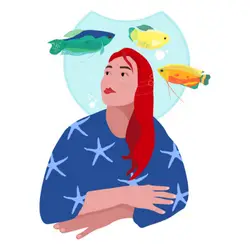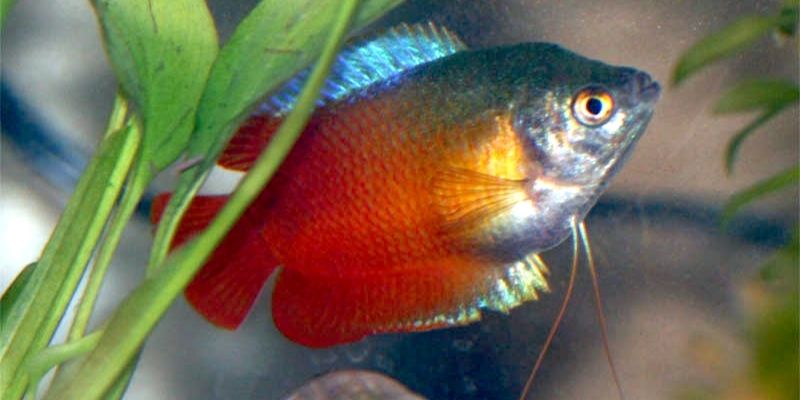If your dwarf gourami is fat, don’t worry! You’re not alone. This happens to a lot of people’s fish, and there are several reasons why it might be.
In this blog post, I’m going to go over the most common causes of obesity in dwarf gouramis and what you can do about it. So read on for some helpful tips!
Why Is My Dwarf Gourami Fat?
Dwarf gouramis are a species of fish that naturally originate from freshwater swamps and natural streams. Their diet consisted mainly of insects, crustaceans, and other small creatures that lived in the water.
In recent years, as aquariums have become more widely accepted, the demand for dwarf gouramis has risen dramatically because of their appearance.
However, since they are not kept in the wild, it is up to us fish keepers to provide them with a quality and nutritious diet that will keep them healthy and fit.
What Causes Dwarf Gourami Obesity?
There are several different reasons why your dwarf gourami might be fat. Here are some of the most common causes:
1. Cleanliness
If you’re feeding your fish the correct diet but they’re still gaining weight, then there may be something wrong with their living quarters. Dwarf gouramis like clean water (obviously), but more than that they like it to be warm.
If their water is too cold, they won’t be able to digest their food properly and a protein called “FGF-23” will build up in their bloodstream. This protein is produced in excess when the gourami’s body temperature is too low. As a result, the fish becomes obese because they are taking in more calories than they can burn.
2. Stress
Stress often leads to an increase in appetite due to the fish’s body converting fat into energy, which makes them feel hungry all of the time. This is particularly true if your dwarf gourami is being kept with aggressive tank mates that are bullying it or picking on it on a regular basis.
If your fish keeps getting harassed, it’s best to look for some tank mates that won’t make it feel stressed out all of the time. For more information on this, check out my blog post on how to prevent bullying in an aquarium.
3. Genetic Predisposition
Some dwarf gouramis are just born with a genetic predisposition to gain weight. There is little that you can do about this, so I suggest getting regular checkups from your veterinarian to make sure they don’t have any underlying health problems associated with obesity.
4. Parasite Load
If your dwarf gourami has a parasite load then it may be gaining weight because of the additional energy required to fight it off.
Here are some of the most common parasites that infect dwarf gouramis:
Internal worms
If your tank contains any of these parasites, you’ll need to get them treated by a veterinarian ASAP!
A fish that has contracted an internal worm will need to be treated with praziquantel or any other medication that specifically targets these types of parasites.
External Flukes
This parasite is often picked up by gouramis at the store when they are being shipped to the aquariums. Luckily, it’s easily treatable with an aquarium salt bath.
5. Eating Too Much
Of course, the most obvious sign of obesity is increased belly fat, and this may be due to your fish eating too much of its regular diet. Dwarf gouramis like to eat pretty much everything that you give them, so if they’re getting into their food before you even turn around and see what’s going on, then they may be eating more than they should.
I strongly recommend that you only feed your dwarf gouramis the recommended amount for their species per day; if you feed them any more than that it will just add to their waistline.
The Final Word
Dwarf gouramis are one of the most popular species of fish to keep in home aquariums today. Not only are they pretty, but they also seem to get along with just about any species of community fish that you choose to put them with.
However, it’s important to understand that all of these qualities cannot make up for an improper diet; if you’re not feeding your fish the right kinds of food, then they are much more likely to become obese. There are several dietary reasons for this, but the most common is overfeeding.
While it’s true that dwarf gouramis will eat just about anything that you put in their tank, they should only be fed the recommended amount per day. If they’re getting into their food before you can react, then consider placing a net over it to keep them from eating too much.
Otherwise, the best thing that you can do for your fish is to ensure that its living environment is clean and free of parasites; if your fish gets sick because its living conditions are unhealthy, it may become obese because of the additional energy it uses up to fight off the invading parasite.

